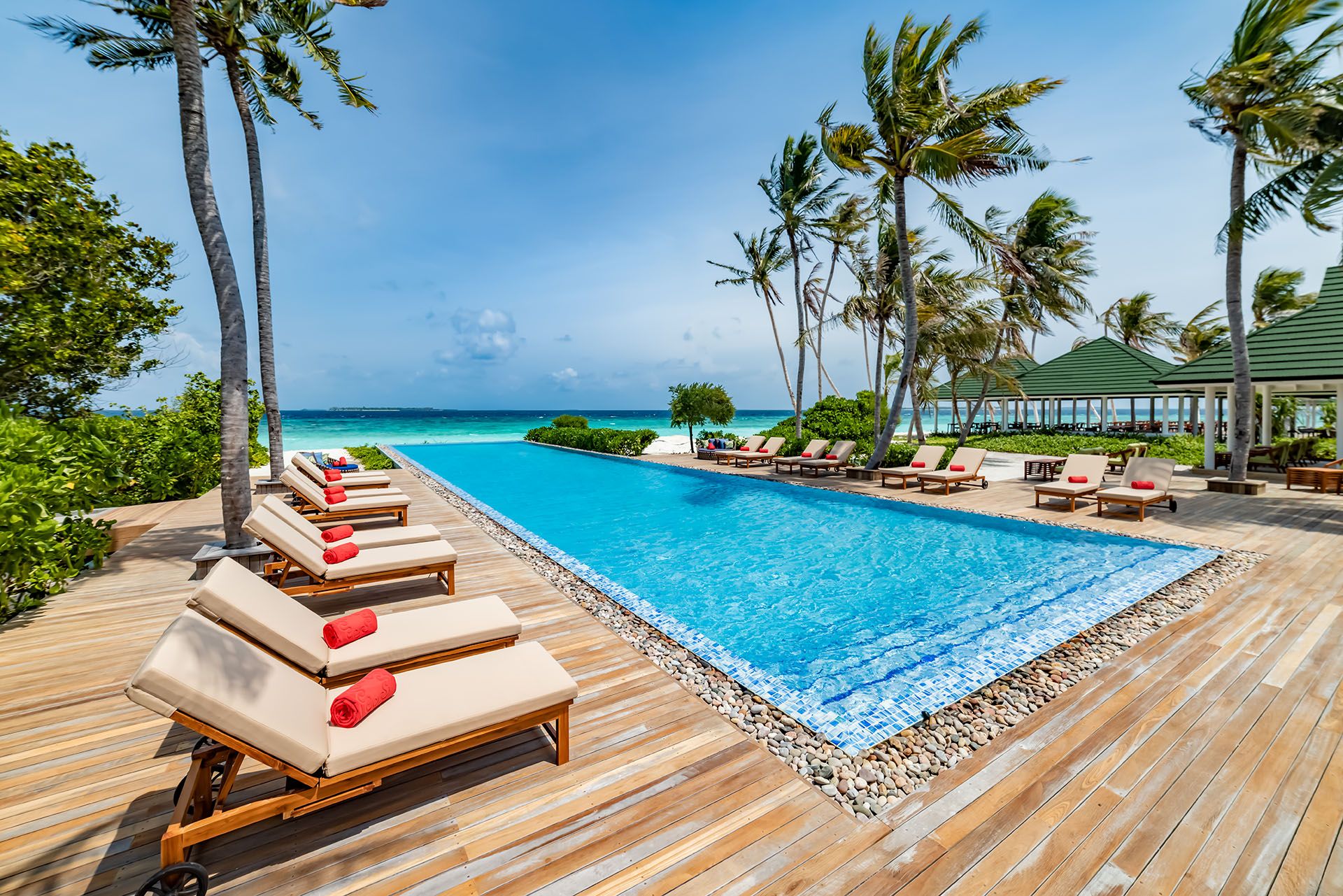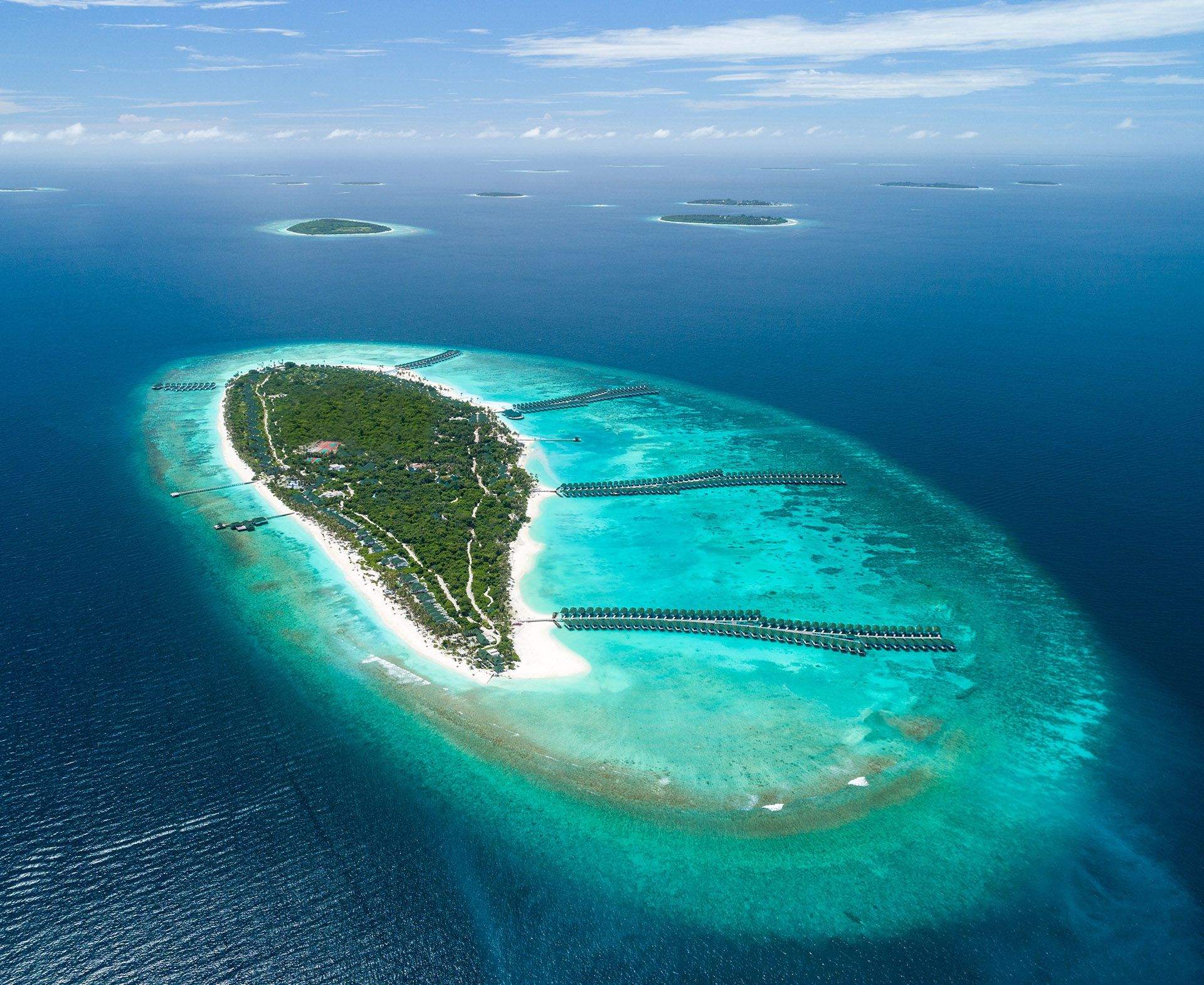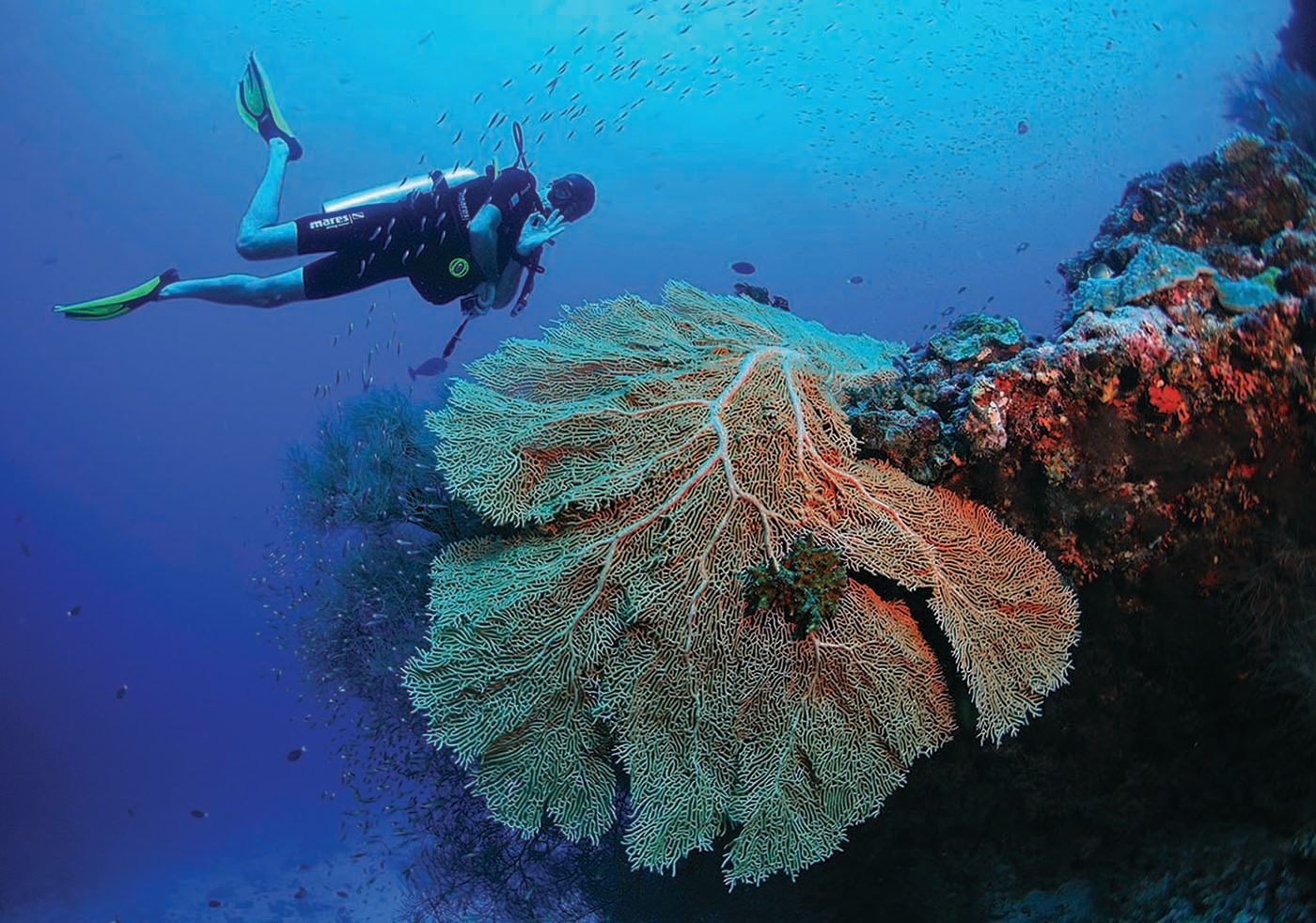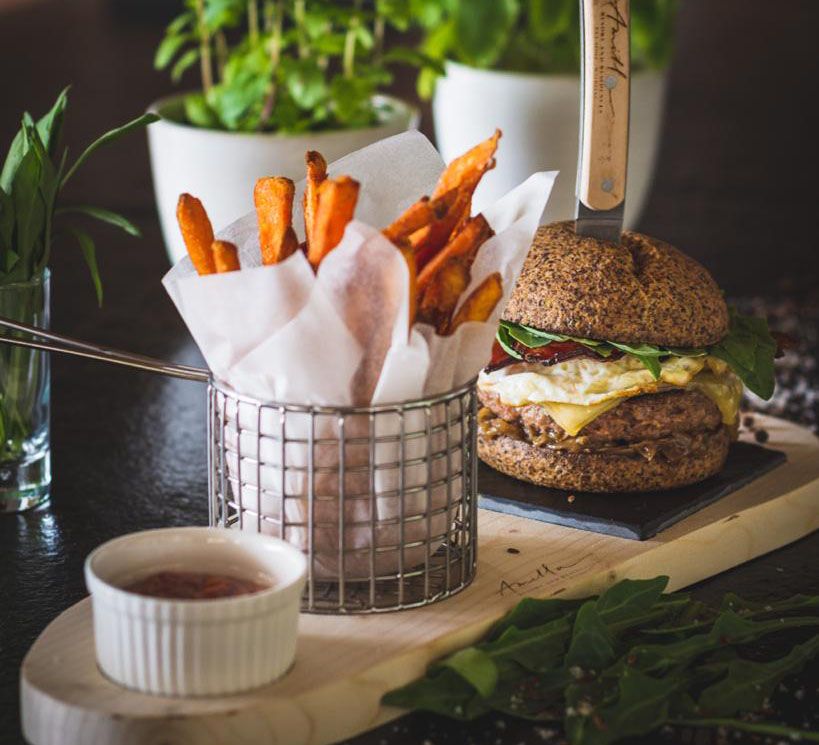Planning your own trip? Prepare for your trip
Use Rough Guides' trusted partners for great rates
Book your individual trip, stress-free with local travel experts
Maldives holidays are known for providing all-out luxury and over-water opulence. But resorts are seeking ways to safeguard the future of these islands in increasingly innovative ways, and tackling sustainability head on.
It’s always struck me as odd that while travellers who head to the Maldives are generally motivated by a desire to spend a week or two in a palm-fringed paradise far from the UK’s damp skies, they often seek out destinations filled with reminders of the region they’re fleeing.

Palm-fringed beach and turquoise waters in the Maldives © Altug Galip/Shutterstock
These reminders are served by the growing number of architecturally-led resorts designed by famous architects from London, Paris or Berlin and wiped clean of any nods to the Indian Ocean, or by the concessions of celebrity-chef-led restaurants and sleek cocktail bars staffed by guest mixologists shipped over from New York or Hong Kong.
It’s also a sad fact – and I speak from experience – that all too often, the only Maldivians you’ll come across are the ones diligently picking your towels off bathroom floors and sculpting them into origami-like sculptures, or driving the buggies which ferry cocktail-clutching hotel guests from A to B. Luckily, change is afoot.
The current Maldivian president, Ibrahim Mohamed Solih, is pushing for the country’s resorts to not only employ more Maldivians, but to offer training schemes such as internships, whether it’s at senior management level, in resort’s marketing departments or in dive schools.

Poolside at Siyam World Mint Bar © Siyam World Maldives
After all, the best ambassadors for the Maldives are surely the ones who grew up here. One person who’s a firm believer in this theory is Ahmed Siyam Mohamed, founder of Sun Siyam Resorts, which operates five resorts in the Maldives. A proud Maldivian, Ahmed has launched various initiatives designed to provide Maldivians with more opportunities for employment in departments which were once – and still are - typically the preserve of foreigners.
Take Siyam World resort, which opened in October 2021. When it comes to the photographs selected by editors and tour operators keen to promote this particular resort, the spectacular shots showing the inflatable obstacle course (the world’s largest), which spell out the word Siyam in supersized, inflatable letters, inevitably hog the limelight.

Maldives holidays at Siyam World © Siyam World
But just as beautiful are the photos and videos produced by the in-house team, which show Maldivians exploring the island, flinging themselves down the slides attached to over-water villas and running down the beach waving Maldivian flags. And it’s not just for show. My scuba diving session on Siyam World isn’t just a first because it’s my first dive on the Noonu Atoll – it’s the first time I’ve dived with a Maldivian instructor.
My instructor might be a rarity in the region, but not on Siyam World, where the dive school is run entirely by English-speaking Maldivian instructors - although some foreign instructors will eventually be brought in to help overcome certain language barriers. Mariyam Thuhufaa, the resort’s resident marine biologist, is Maldivian, too.

Siyam World © Siyam World Maldives
Mariyam’s job, which includes overseeing a coral propagation and restoration programme, isn’t just important because it improves the health of the surrounding reefs and marine life in a way which guests can understand (guests will eventually be able to get involved with the coral propagation programme).
She’s on a mission to change the way Maldivians view their underwater world, too. “I’ve recently done quite a bit of work with kids from communities on local islands, to show them how to get into this type of work. Maldivian children are in the perfect position – they can access the water any time they want. If they want to do their own research, they just need to get out of their house and get into the water.”

Snorkeling in the Maldives © salajean/Shutterstock
Finding a balance is crucial. Amilla, which is in the Baa Atoll UNESCO Biosphere Reserve, isn’t new, but during the recent pandemic-related downtime, the owners decided to overhaul their approach to sustainability. One of the first steps was to recruit a marine biologist and in summer 2021, Chiara Gambini, an Italian marine biologist who’s worked all over the world, arrived to guide the resort’s sustainability efforts and to devise new ways to encourage both staff and guests – especially younger ones – to take more interest in the wildlife above and below the water.
As a foreigner, Chiara has had to tread carefully, finding a balance between pushing for change without appearing to lecture locals – whether it’s the dive boat captains or the workers helping to offload supply ships - who often see the ocean differently to her. “One time, I was on boat with a Maldivian colleague and he tossed his cigarette in the water,” recalls Chiara.

Sea turtle in the waters of the Maldives © Willyam Bradberry/Shutterstock
“I spoke to him and explained that I knew this was his country, but that’s precisely why he needed to protect it. I’ve also had foreign guests at other resorts ask me why people have a problem with shark finning, and telling me that it’s fine because fins will grow again. And I’ve heard about guests plucking sea cucumbers out of the sea and barbecuing them on the beach. There’s a lot of misinformation and my role is to educate people.”
There’s a genuine, tangible passion for the ocean on Amilla, not just from Chiara but from the entire workforce. When I head out on a manta ray-spotting snorkelling trip on a particularly windy day, the captain suddenly stops dead in the water. Bobbing along in the current is a small plastic bottle, which a member of staff deftly hooks out of the water.

Diving in the Maldives © Amilla Fushi
Sadly, the mantas don’t put in an appearance, although I gain a different, unexpected insight into the region, watching the resort’s divemasters freedive into the depths to retrieve marine waste they’ve spotted flailing on the seabed, including what appears to be a hessian sack with trailing, looped ropes just the right size to ensnare a passing manta or dolphin.
One factor which prompted Amilla’s owners to overhaul the approach to sustainability – particularly in terms of food - was the fractured supply chains resulting from the pandemic. “Five months of cabbage, carrots and onions was pretty harsh,” says resort manager Victoria Kruse. Today, Amilla has its own banana plantation, hydroponic garden and mushroom hut. Younger guests can help collect eggs from Cluckingham Palace – a chicken house resembling a Maldivian dwelling – and the island’s 2,500 coconut trees don’t just produce coconut cream and oil.

Sunset at Amilla Fushi © Amilla Fushi
The husks are used as roofing material (along with recycled glass) and will soon be used to make coir rope, too. It’s not just coconuts which are used in their entirety. Parts of fruits and vegetables which would normally be thrown away are used to make dishes (standouts include the caramelised broccoli stems and vegetable peel fritters) and alongside the homemade probiotic sodas and kombuchas, there’s a delicious tepache – a fermented drink made from pineapple rind.
One of the latest additions to the menu is the resort’s delicious ethical burger, which I’m given the opportunity to taste test. “It came about because we recently changed our suppliers so that all our meat was ethically sourced, free-range, grass-fed and antibiotic-free,” says Victoria Kruse, Amilla’s sustainability manager, who admits being sustainable isn’t easy when you’re on an island in the middle of the ocean.

Ethical burger on the menu at Amilla © Amilla Fushi
“Almost all food is flown into the Maldives and it’s almost impossible to get to zero food miles, but we think this is about as close as it gets,” says Victoria. “The roll is made with flaxseed and cider vinegar so it’s very alkaline. Then you’ve got dandelion leaf, which grows wild on the island and is high in inulin, a prebiotic fibre which helps to regulate blood sugar levels.
The beef comes from Tasmania’s Cape Grim area, which is on record as having the cleanest air in the world. It also rains a lot there, which means the cows don’t have to walk very far to get their food. The burger’s topped with mushrooms grown in the mushroom hut, and finished with homemade pickles and a homemade banana ketchup.”
While other islands claim to reduce plastic but fill guest rooms with water bottles, I struggle to find a single piece of plastic on Amilla, which boasts the Maldives’ only stilted treetop villas – palatial treehouse-like retreats surrounded not by the ocean but by dense greenery. Guests are asked to take any plastic bags they bring with them back home (Amilla’s minimal plastic waste must be sent elsewhere for processing) and children are given organic cotton toys rather than cheap plastic tat.

Amilla Fushi's Wellness Tree House © Amilla Fushi
They’re also given a backpack in the shape of a white-tailed tropicbird, a species which usually nests on uninhabited islands but has – to the resort’s credit - deemed Amilla worthy of its presence. Further nods to the region are in evidence at the spa, where a Maldivian spa manager has rolled out a menu of traditional dhivehi beys treatments (dhivehi means Maldivian and beys means medicine). Recently, Amilla became the first resort to hold a Maldivian Culture Week celebration, bringing in Maldivian musicians, fashion designers and a local lacquer artist.
It’s an approach which is being copied elsewhere. On North Male Atoll’s new, super-slick Patina Maldives, Fari Islands resort, which was designed by Brazilian architect Marcio Kogan and which wouldn’t look out of place in Palm Springs, lessons at the kids’ club include masterclasses in Maldivian cooking. Patina is an artificial island so although it’s not as lush as other destinations, transplanted trees, bushes and flowers mean it’s getting greener by the day.

Patina © Georg Roske
There are plans for activities – such as forest bathing – which will encourage guests to spend more time appreciating their environment, rather than simply soaking up the views from their over-water villa. I also learn there’s an upside to the modernist, cubic shapes of the guest villas – their flat roofs are perfect for solar panels, which are being rolled out across the island. The dive school and kids’ club are already powered entirely by solar energy.
But when it comes to nods to the region, it’s Siyam World which comes top. Stationery placed in guests’ rooms bears images inspired by a now-discontinued Maldivian postage stamp, and staff uniforms feature traditional Maldivian designs. Maldivian staff are employed at all levels – the resort’s general manager is Maldivian, and the wines served during my dinner at Barrique, the resort’s fine dining option, are poured by a Maldivian sommelier. Although it’s the Maldives largest resort, with 472 villas spread over 54 hectares, it retains a wonderfully wild feel, with vast tracts of greenery to explore.

The inflatable obstacle course at Siyam World © Siyam World
A member of staff points out the remains of an ancient well, dug centuries ago by Maldivians who’d stop on the island overnight, and who needed a fresh water source, and one day, deep in the undergrowth, I discover the crumbling ruins of an ancient, fenced-off memorial. Later, I learn that the resort’s owners are working with historians to learn more about the identity of the person buried there. Suddenly, infinity pools and over-water villas seem rather boring.
Plan your ultimate getaway in the Maldives and book a stay with Amilla, Siyam World, or Patina resorts.
Top image: Poolside at Siyam World Mint Bar © Siyam World Maldives
written by
Tamara Hinson
updated 05.06.2024
Tamara is a former snowboard instructor who's been a freelance travel writer for 12 years. She loves snowboarding, hiking, mountain biking and scuba diving, and the regions she knows best are Asia, America and Africa. Europe-wise she knows Germany and France very well. In normal times she does two or three trips a month. Follow her on Twitter @tamarahinson
Use Rough Guides' trusted partners for great rates